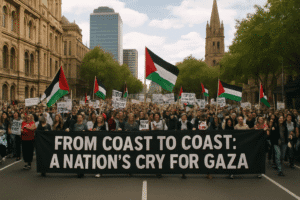From Coast to Coast: A Nation’s Cry for Gaza Echoes in Australian Cities
Tens of thousands of Australians rallied in over 40 cities and towns, demanding government action against the war in Gaza. Protesters called for immediate sanctions on Israel and a complete arms embargo, mirroring policies applied to other nations. The movement gained powerful voices, with figures like journalist Antoinette Lattouf and former Australian of the Year Grace Tame addressing the crowds. Politicians, including Greens and Independent senators, pledged their support and promised to increase pressure on the federal government.
The rallies were fueled by a UN-backed declaration of famine in Gaza, which organizers labeled a deliberate act. This domestic pressure coincides with a notable diplomatic fracture between Australia and Israel. The protests, among the largest in recent history, signal a potent and sustained public demand for a fundamental shift in foreign policy.

From Coast to Coast: A Nation’s Cry for Gaza Echoes in Australian Cities
Tens of thousands of Australians poured into the streets of over forty towns and cities in a powerful, coordinated day of action, delivering a resounding message to the federal government: sanction Israel and end the war in Gaza. The nationwide rallies, among the largest protest movements in recent Australian history, were galvanized by a UN-backed declaration of famine in Gaza and a growing public demand for a shift in foreign policy.
The protests, organized by the Palestine Action Group, represented a diverse cross-section of the community. From major capital cities to regional centres like Mackay, Bathurst, and Margaret River, demonstrators gathered under a common banner of outrage and grief. In Melbourne, a sea of attendees filled the streets around the State Library of Victoria, while in Brisbane, organisers hailed a record-breaking turnout despite a last-minute court decision that prevented them from marching across the Story Bridge.
The Core Demands: Sanctions and an Arms Embargo
The protests were unified in their objectives. Organisers and speakers explicitly called for the Australian government to impose crippling economic sanctions on Israel, drawing a direct comparison to those placed on Russia following its invasion of Ukraine. A second key demand was for an immediate two-way arms embargo, halting the export of all Australian weapons components to Israel and the import of Israeli-made arms.
“We are hoping the government responds to people power,” said Palestine Action Group organiser Amal Naser, signalling a commitment to sustained pressure. “We will continue to build up the momentum.”
Voices from the Podium: A Coalition of Conscience
The rallies featured a notable coalition of community leaders, journalists, and politicians who amplified the protesters’ demands.
- Political Figures: Greens Senator Larissa Waters in Brisbane and Independent Senator David Pocock in Canberra argued that Australia must leverage its position as a “middle power.” Pocock called for targeted sanctions on Israeli Prime Minister Benjamin Netanyahu and his government. In Melbourne, Independent Senator Lidia Thorpe drew parallels with First Nations struggles and called for a comprehensive cultural and economic boycott of Israel.
- Journalistic Courage: High-profile journalist Antoinette Lattouf, recently successful in an unlawful dismissal case against the ABC, addressed the Sydney crowd. She paid solemn tribute to the over 180 journalists killed in Gaza, framing their deaths as an attack on truth itself. “To newsroom leaders I say, history is watching. It will not forgive stenographers of apartheid and genocide,” she stated, urging media outlets to resist lobbyist pressure and demand access to Gaza.
- Moral Authority: Former Australian of the Year Grace Tame used her platform in Sydney to encourage those too afraid to speak out to find their voice. “There is another force that power responds to and it is public pressure,” she said, highlighting the movement’s growing influence.
The Unignorable Context: Famine and Diplomatic Fracture
The protests were underscored by two pivotal developments. The first was the recent determination by the IPC Famine Review Committee that famine is now present in Gaza City and northern Gaza—a crisis it described as entirely man-made. While Israel rejected the report as “biased,” protesters echoed UN officials in calling it a “moral indictment.”
The second was the very public deterioration of Australia-Israel relations. Prime Minister Anthony Albanese’s moves toward recognising Palestinian statehood and a recent visa denial for an Israeli politician triggered a direct personal attack from Israeli Prime Minister Benjamin Netanyahu, who labelled Albanese a “weak politician.” This diplomatic rift suggests the Australian government’s stance is already shifting, and protesters are demanding it move further and faster.
A Mirror Protest and a Movement’s Resolve
Adding a layer of global context, the Australian events mirrored a massive demonstration in Israel itself, where an estimated 500,000 people gathered in Tel Aviv to call for an end to the war and for the government to secure the release of hostages held by Hamas.
For the Australians marching, the message was one of international solidarity and unwavering domestic pressure. As one protester’s sign read, “Palestine will never walk alone.” The day’s events proved that to be true in Australia, but the larger question remains whether the footsteps of tens of thousands will finally compel the government to walk a different diplomatic path.
You must be logged in to post a comment.